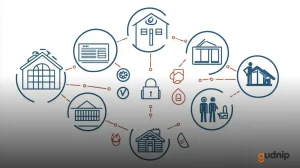Investment properties are increasingly becoming a popular choice for those looking to diversify their portfolios and generate passive income.
With the right strategies and knowledge, anyone can turn real estate into a powerful wealth-building tool.
Understanding investment properties
Understanding investment properties is crucial for anyone looking to enter the real estate market.Investment properties are properties acquired for the purpose of generating income, either through rent or profit from resale.
These properties can range from single-family homes to multi-family units and commercial buildings. When considering an investment property, it’s important to analyze the location, as this can significantly impact its value and rental potential.
Researching factors like market trends, nearby amenities, and the community can help investors make better decisions. Additionally, understanding the cash flow and the potential return on investment is essential before any purchase.
Always consider the expenses involved, such as property taxes, maintenance costs, and insurance, to ensure the property will be a profitable investment. By grasping the basics of what comprises an investment property, individuals can build wealth and achieve financial freedom through smart real estate decisions.
Top locations for investment properties

The location of an investment property plays a pivotal role in determining its success. A well-chosen location can lead to high rental demand, property value appreciation, and overall profitability.
Key Locations to Consider:
- Emerging Neighborhoods: Areas undergoing revitalization often see rising property values, making them an excellent investment choice for long-term growth.
- University Areas: Proximity to universities guarantees a steady stream of renters, particularly for multi-family units or student housing.
- Economic Growth Hubs: Cities with growing job markets and expanding industries attract tenants and buyers, driving demand for rental properties.
- Suburban Areas with Strong Amenities: Locations near good schools, parks, shopping centers, and public transport make properties more desirable to renters.
- Proximity to Major Employers: Areas close to large employers or corporate hubs ensure a constant influx of potential tenants.
- Regions with Price Appreciation Potential: Research neighborhoods where property prices have shown consistent growth or are expected to rise.
- Networking with Local Realtors: Establishing connections with real estate professionals can provide insights into hidden gems and upcoming hot spots.
By focusing on these key factors, you can identify investment locations with the highest potential for success.
Financing your investment properties
Financing your investment properties is a critical step that can influence your success in real estate. There are several options available, each with its benefits and challenges. One common method is taking out a traditional mortgage, which typically requires a down payment and a good credit score. Lenders will assess your financial history and the property’s value to determine the loan amount.
Another option is hard money loans, which are short-term loans based on the property’s value rather than your creditworthiness. These can be useful for quick purchases, but they often come with higher interest rates. Using cash can also be a smart strategy if you have it available, allowing you to avoid interest payments and financing fees.
Additionally, consider exploring investment groups or real estate crowdfunding platforms. These allow multiple investors to pool resources to finance properties, spreading the risk and reducing the financial burden on individual investors. Each financing option has its own requirements, so it’s essential to do thorough research and choose the one that aligns with your investment goals.
Strategies to maximize profit

Strategies to maximize profit from investment properties involve careful planning and smart management. One effective approach is to focus on upgrading the property to increase its value. Simple renovations, like updating kitchen appliances or refreshing the landscaping, can attract higher-paying tenants. Additionally, consider enhancing curb appeal as it significantly influences first impressions.
Another strategy is to set your rental price competitively. Conducting research on similar properties in the area helps determine the best price that meets market demand while ensuring profitability. Providing flexibility, such as accepting pets or offering short-term leases, can also widen your tenant pool.
Effective property management is critical for maintaining occupancy rates. Providing excellent communication and quick responses to tenant issues fosters satisfaction and encourages lease renewals. Lastly, maximizing profit can be achieved through thorough record-keeping and using software to manage finances efficiently, tracking expenses and income can identify areas to cut costs and improve cash flow.
Common mistakes to avoid
Making the right decisions is crucial in real estate investment. Many new investors overlook key factors that can affect profitability and long-term success.
Mistakes to Watch Out For:
- Skipping Market Research: Failing to research local property values, rental rates, and trends can lead to overpaying for a property or choosing a location with low demand. Always research the neighborhood and compare properties to ensure you’re making a sound investment.
- Underestimating Ownership Costs: Property ownership involves more than just the purchase price. Costs like property taxes, maintenance, insurance, and management fees can add up quickly. It’s important to account for these ongoing expenses in your budget.
- Lack of a Clear Investment Strategy: Without a clear strategy, such as flipping houses or holding for rental income, you might make impulsive decisions that don’t align with your financial goals. Set clear objectives before investing and stick to your plan.
- Making Emotional Decisions: It’s easy to get attached to a property, but emotional decisions can cloud judgment. Always base your choices on data and objective analysis, not just gut feelings or personal preferences.
- Neglecting Property Management: Poor property management can lead to higher vacancy rates and more maintenance costs. Regular upkeep, addressing tenant concerns, and ensuring proper rent collection are essential for keeping your property profitable.
By avoiding these common mistakes, you’ll be on your way to making more informed and profitable investment decisions.
Key strategies for successful real estate investment
Investing in investment properties can be a rewarding endeavor if approached with care and knowledge.
By avoiding common mistakes, understanding financing options, and implementing strategies to maximize profit, investors can significantly enhance their chances of success.
Ultimately, continuous research and a clear investment plan will help you navigate the complexities of real estate investment and achieve your financial goals.





